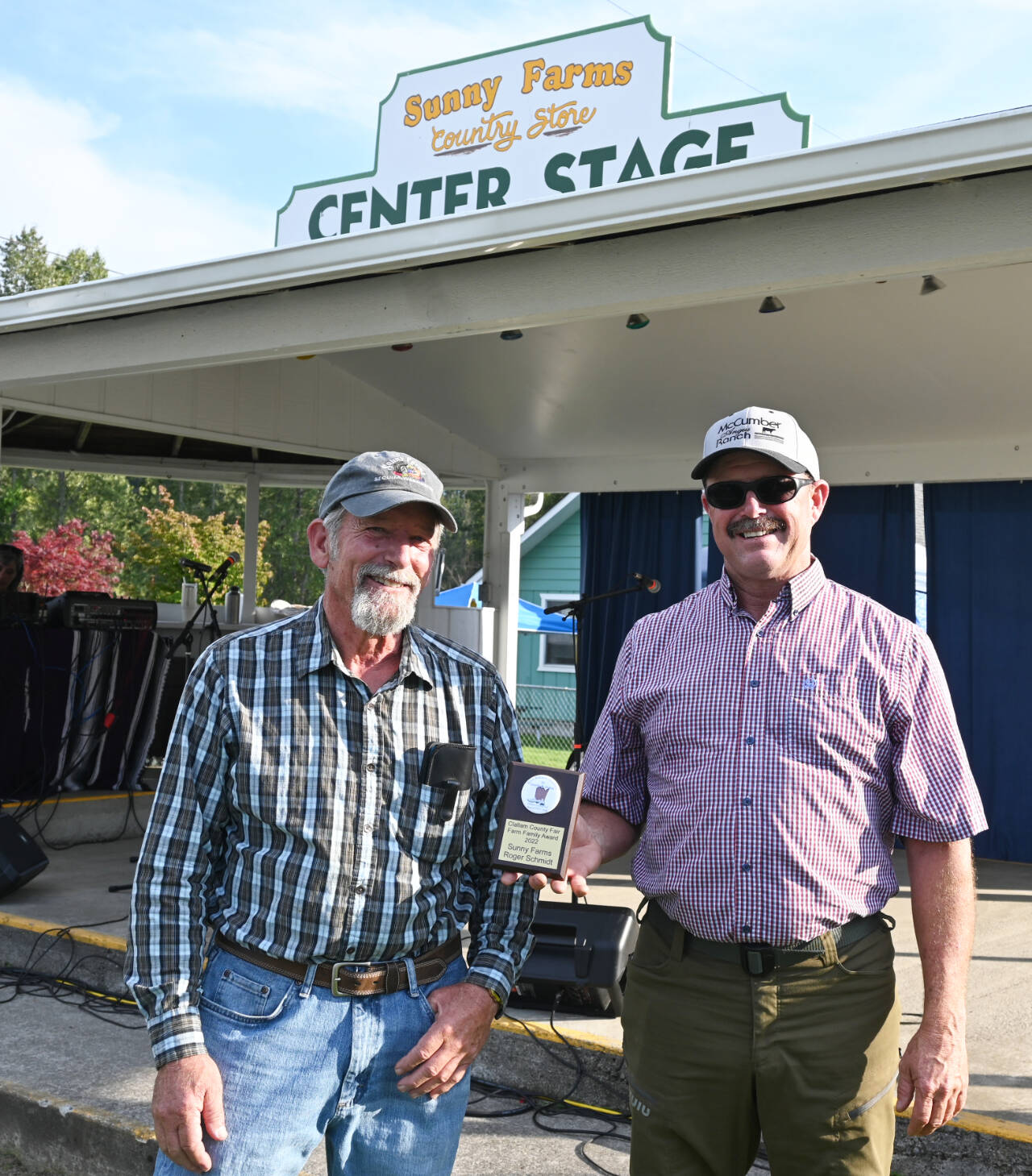After a two-year hiatus, the Clallam County Fair’s Farm Family of the Year award was handed out — and fittingly, on a stage named for the honoree’s business.
Roger Schmidt, the longtime farmer and grocer whose iconic Sunny Farms storefront opened in 1979, was honored posthumously with an award that was inaugurated in 2019 but was (along with the fair) suspended in 2020 and 2021 because of COVID restrictions.
Schmidt died at age 81 on April 5 of Parkinson’s Disease.
His son Jeff, who runs the JR Ranch in Othello he and Roger founded in 1991, made the trek from Eastern Washington to accept the award on Aug. 18.
“If there was one thing Roger was, he was a farmer; he loved to grow things [and] he loved the dirt,” Jeff said.
“I would have loved for him to be here. But it wasn’t meant to be.”
Jeff Schmidt accepted the honor from KONP’s Todd Ortloff on the steps of the fairgrounds’ Sunny Farms Stage.
Roger met his wife Ellie on a bind date at the Seattle World’s Fair in 1962 and the pair were married later that year.
Roger moved first to Sequim in 1972 to establish their Sequim farm Olympic Mountain View Nursery planting peas, beans, potatoes and more, while continuing to work in Seattle. The family moved full-time to Sequim in 1974, and after a time selling produce from their garage they opened Sunny Farms Country Store on June 5, 1979.
Roger and Ellie have seven grandchildren and nine great-grandchildren.
The Clark Family of Dungeness was awarded the first Farm Family of the Year honor in 2019.
Fair leader gives Clallam good grade
Fair Commissioner Ron Crawford had heard a lot of good things about the Clallam County Fair before he visited it for the first time Saturday.
As one of one of seven state Department of Agriculture fair commissioners whose job it is to evaluate the 68 agricultural fairs in Washington state they visit on a biannual basis, Crawford has been to many, many fairs.
But Clallam’s, he said, stood out.
“This is one of the most complete fairs I’ve seen,” said Crawford, who has been a commissioner for about 10 years. “They are doing a wonderful job, way above average.”
The four-day Clallam County Fair ended Sunday, Aug. 21.
While Crawford praised the Clallam County fair’s clean and attractive grounds, and well-laid out barns and display halls, it was placing education at the front and center of its exhibitions that impressed him most.
“Fairs across the state do a pretty good job at it, but this fair goes even beyond that. They’ve got a bee exhibition and things going on in all the buildings,” Crawford said.
“I love it that when you walk into the barn a little girl asks you if you have a question about the animals. That’s an educational value that’s really important.”
Crawford said hands-on activities, posters made by 4Hers and even the petting zoo all contribute to an experience that reminds the public about the purpose of fairs.
“Fairs are a really unique situation,” Crawford said. “They carry on the tradition of rural agriculture and the rural way of life.”
But fairs across the state are facing significant challenges to their viability and will need to re-think their programs if they are to thrive, Crawford said.
Recruiting volunteers to serve as everything from building superintendents during the fair to the year-round commitment of being a 4H leader remains a problem.
However, it is declining 4H and FFA participation numbers that is particularly worrisome.
“Youth are the backbone of the county fair,” he said. “It will take a couple of years to get it back to where it was.”
Crawford said he sees promoting 4H presentations that go beyond posters and PowerPoints and encouraging enrollment in programs like robotics, STEM and civic engagement as keys to helping it rebound.
“The potential is wide open to do hands-on exhibits at the fair that are educational for both exhibitors and visitors,” Crawford said.
“Getting high schools more involved in 4H like they are in FFA can reach those kids that might not know about the programs.”
State fair commissioners’ evaluation reports like Crawford’s are important measures of how well a fair is meeting state standards and identifying areas of improvement.
And it’s critical because the commission makes recommendations to the state Department of Agriculture on how the department’s annual distribution of about $2 million financial assistance should be allocated. In 2023, that amount will increase to $4 million a year.
According to the state, the Clallam County Fairgrounds in April received $25,000 in a second round of capital improvement funding to install security lighting and electric boxes and move overhead wiring underground.
Crawford called Clallam County’s a “sleeper fair.”
“It’s small, but it’s pleasant and well organized and I’d like to convince people to take an afternoon to show what you’re doing,” he said.



